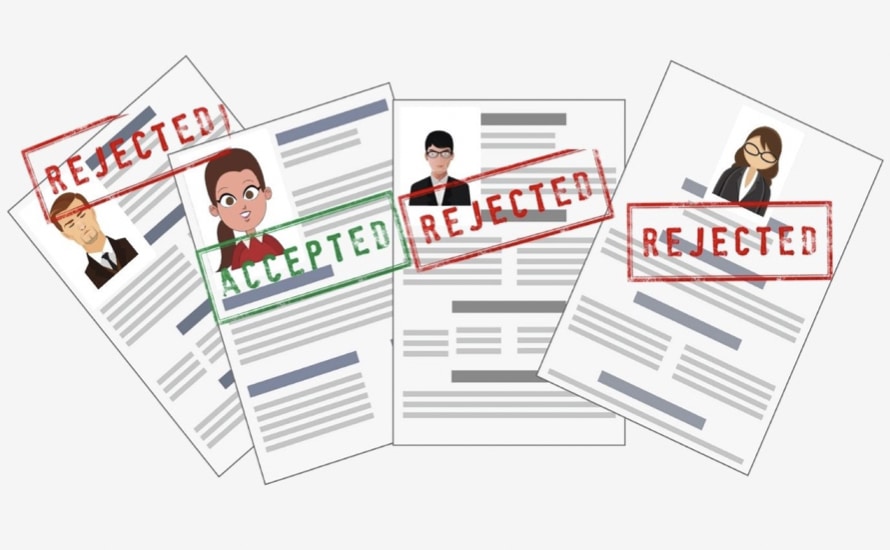According to Business Insider, the odds of getting hired by McKinsey & Company are less than 1%, although this is not unique to McKinsey. To secure a final round interview at Bain, you would have to be in the top 3% of applicants for that office. No one enjoys being turned down, especially in the case of a consulting role where a lot of preparation is required.
According to 80,000 HOURS, there are more highly qualified people than there are jobs at top strategy consulting firms, and it is implausible to be more than 50% confident that you can get an offer regardless of how qualified you are. Fortunately, a top management consulting firm is not the end all and be all. There are many successful people in the world of business that were rejected by consulting firms and went on to achieve great feats.
In order to learn from your experiences, and continue accelerating towards your goals, it’s imperative to deal with rejection in a mature way. In order to do this, you can follow what I call the R.I.R approach: Reflect, Identify and Refine.
1. Reflect on the Situation
The key thing to do after a rejection is to reflect on the interview process and ask for feedback. Self-analysis alone won’t give you a holistic picture of why you did not get an offer, so start by getting feedback from the recruiter and the interviewers.
You may receive initial feedback that feels generic, similar to this:
“After careful evaluation of the qualifications and experience required, you have unfortunately not been selected to continue with the application process.”
Do not be afraid to ask for a more detailed assessment of your performance. After all, those insights are available and would help you understand where you need to develop.
Review the feedback you receive, and reflect on your own experience, from the way you prepared and researched through to your interactions in the interview. Ask yourself, “What did I do well and what could I have done differently?”
Could you have practised more cases? Was mental math your Achilles’ heel? Did you focus too much on technical competence at the expense of showcasing your softer skills?
There is always room for improvement, so use setbacks as learning opportunities.
2. Identify Areas for Improvement
Think about feedback from past rejections and appraisals. Are there any recurring themes? If so, these should be your development priorities, which you can use to create a development plan.
There may be training or informal coaching you can undertake to help you develop. For example, doing a course on LinkedIn on ‘Communicating with Confidence’ could help you develop your interview skills. Or, doing brain exercises on the Elevate App could improve your mental math and reasoning skills.
At times, rejection may simply be out of your control. Certain things cannot be enhanced or improved on in the interview process. If the interviewer is looking for someone with a solid understanding of financial markets and you have an engineering background, then you might be best to focus on things that you can realistically improve rather than freaking out that you are not a finance major.
3. Refine Your Search
The feedback you receive from the interview should help you decide whether the role was a right fit for you. Use the experience to help you refine your job search, and keep in mind that management consulting is not the only way to pursue a successful career.
Networking can make a big difference in the application screening stage and can increase your chances of being invited for an interview. Landing an interview is no walk in the park, so connecting with recruiters during networking events can be very fruitful.
If you find yourself struggling to get an offer from a top management consulting firm, look for a position that replicates a good portion of the learning experience that you would have received from a top firm. Here are a few options that could be worth exploring:
- Start-ups – Working in an environment with less resources and people can allow you to accelerate your career by taking on more responsibilities more quickly and gaining exposure to senior people. Being in a start-up may also enable you to work across a variety of areas. AngelList is a great place to look for start-up jobs.
- Boutique consulting firms – There are many great boutique consulting firms that one can work for, especially if you already have experience in a specific industry. Vault created a list of some of the best boutique firms to work for in 2020.
- Private equity – Some ex-consultants opt to work for private equity firms when exiting a career in management consulting. University graduates interested in private equity from the get go usually start off in investment banking. Your day-to-day tasks may not be similar to those in consulting, but you are likely to use your business skills and industry specific knowledge to find innovative ways to improve a PE fund’s portfolio companies.
Final thoughts
Rejection can be painful but, in the long run, you will be more resilient if you can see each setback as an opportunity to develop your self-understanding. By learning from your mistakes and constantly improving yourself, you will increase your chances of finding roles that are in tune with your capabilities and ambitions.
Oduor Ochieng is an Economics Honors student at the University of Cape Town. He has experience working in a Medical startup and Fintech company.
Images: Oduor Ochieng, Unsplash

